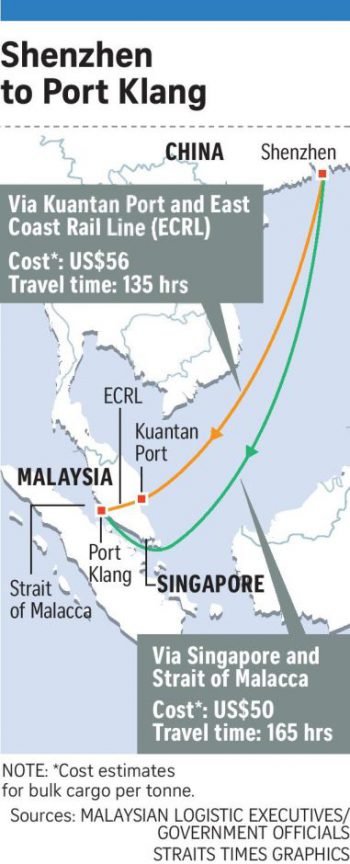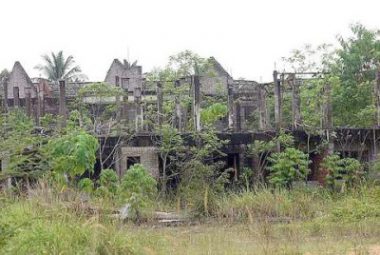East Coast Line hailed as game changer
The East Coast Rail Line project (ECRL) will connect ports on the east and west coasts of Peninsular Malaysia and could alter regional trade routes between the Straits of Malacca and the South China Sea via Singapore. Along Peninsular Malaysia’s east coast, millions of tonnes of sand are being dredged up from the South China Sea to get Kuantan Port ready for the country’s priciest infrastructure project yet: a RM55bil railway link financed by China. The proposed 620km electrified railway line will start from Tumpat, Kelantan down to Kuantan Port, and cut through the central mountain region to Port Klang. While the entire stretch is expected to take over a decade to build, top priority will be placed on the construction of the 250km section connecting Kuantan Port with Port Klang. If everything comes together as planned, the new links could bypass Singapore and offer exporters new options to reach markets in North Asia. (The Star Online)

East Coast Rail Line project
SP Setia preparing maiden entry into Penang
SP Setia Bhd is acquiring five parcels of land measuring a total of 677.8ha in Seberang Perai Utara, Penang from Boustead Plantations Bhd (BPB) for RM620.12 million. Its wholly-owned subsidiary Setia Recreation Sdn Bhd had placed a successful tender for a proposed township development with GDV of about RM9.6 billion. This marks the group’s maiden entry into mainland Penang. S P Setia targets to launch the township development on the land in 2019/2020 and it is expected to take 15 to 20 years to complete. (The Edge Markets)
KIP REIT to raise RM234mil via Main Market listing
KIP Real Estate Investment Trust (KIP REIT), a wet market and conventional shopping centre operator, is seeking to raise as much as RM234.15 million via a Main Market listing on Bursa Malaysia. The amount is derived from its issue price of RM1 per share for 234.15 million offer units in its initial public offering (IPO). The REIT principally invests in retail real estate and its initial portfolio will comprise KiP Mart Tampoi, KiP Mall Bangi, KiP Mart Kota Tinggi, KiP Mart Melaka, KiP Mart Masai and KiP Mart Lavender Senawang. KiP Marts are a hybrid between a traditional wet market and a conventional shopping centre, it said, while the KiP Mall is a neighbourhood conventional shopping mall, all of which cater to lower- to middle-income customers. (The Edge Markets)
Speculation driving up Kelantan house prices
House prices in Kelantan, regardless of in the city of rural areas, are becoming expensive as developers tend to increase the selling prices when they receive high demand for the houses after they are 50% complete. State Malay Contractors Association president Datuk Mohd Rosdi Abdul Aziz said even though the costs for the material, size, location, finishing and design of the houses as well as demand were factors in determining house prices, greedy developers who rake in excessive profit have made matters worse. The price of a RM200,000 house could be raised up to RM250,000. Mohd Rosli said the government should intervene by setting a ceiling price for medium-cost and low-cost housing. (Malay Mail Online)
Malaysia extends bauxite mining ban for another 3 months
The moratorium on bauxite mining in Kuantan has been extended a further 3 months, from the start of 2017, to allow remaining stockpiles to be cleared. The high stockpiles, nearly a year after the ban was first imposed, suggested illegal mining may have been carried out. About 2.95 million tonnes of stockpiles remain around Kuantan, the capital of the key bauxite producing state of Pahang. There was about 3.6 million tonnes of stocks in April. In January, the government imposed its first three-month ban on mining the commodity, before extending it multiple times. (Astro Awani)
Schoolbus group urges DBKL to fine-tune proposed free service
The Coalition of School Bus Operators Association of Malaysia is concerned that Kuala Lumpur City Hall (DBKL) will be overwhelmed by its free bus programme. DBKL must improve the logistics and safety measures in the programme, targeting children living in People’s Housing Projects (PPR). More than 6,000 students from 60 housing projects are expected to benefit from the programme starting January 3. It is reported that 100 school bus operators have signed for the programme, but there are concerns whether they are up to the task or even legally registered with SPAD. Once they are registered it means the drivers are licensed to ferry students and their passengers are insured. (Malay Mail Online)





